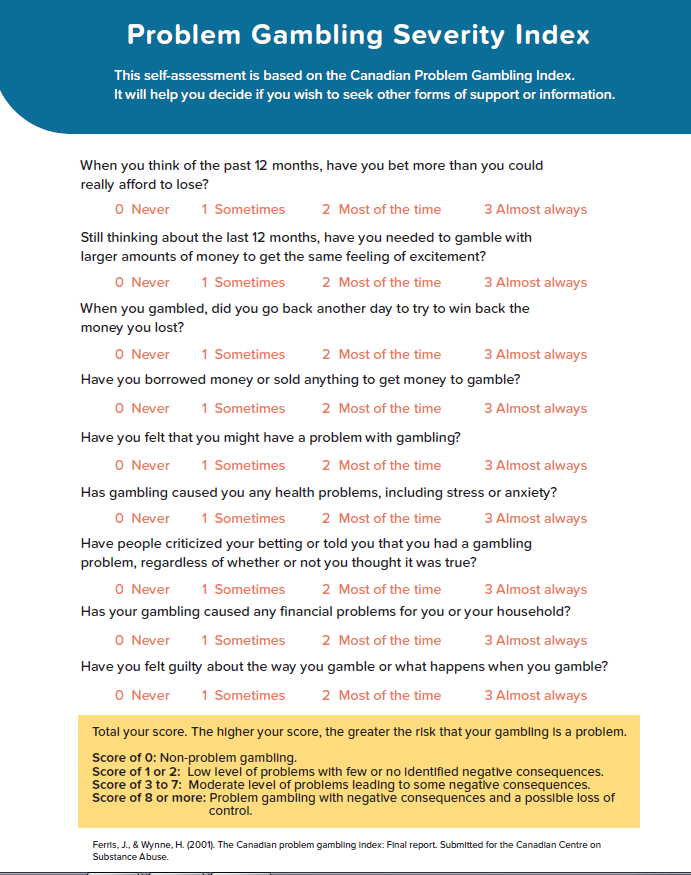Canadian Problem Gambling Severity Index
The Canadian Problem Gambling Index: Final report. Ottawa: Canadian Centre on Substance Abuse. Has been cited by the following article: TITLE: Problem Gambling, Gambling Correlates, and Help-Seeking Attitudes in a Chinese Sample: An Empirical Evaluation. AUTHORS: Jasmine M. Loo, Tian Po Oei, Namrata Raylu. KEYWORDS: Chinese, Gambling. The Problem Gambling Severity Index (PGSI) included in the Canadian Problem Gambling Index (CPGI) (Ferris and Wynne 2001) was used to assess gambling status. 2009), 9.4% scored in the severe problem gambler range on the Problem Gambling Severity Index of the Canadian Problem Gambling Index (CPGI/PGSI). In addition, another 15.7% reported moderate levels of gambling problems for a total of 25.1% suffering from some degree of gambling problem. Similar figures have been reported in. Problem Gambling Severity Index Survey. This self-assessment is based on the Canadian Problem Gambling Index (Ferris & Wynne, 2001). This quiz allows you to consider how your gambling compares to a measure of risk around gambling. One recently developed scale, the Canadian Problem Gambling Index (CPGI), has received attention as a potential successor to previous instruments. Developed largely as a response to the criticism around the SOGS, the CPGI has been presented as a modern and promising tool for use in problem gambling prevalence research.
Screening tools
The PGSI, developed in Canada (Ferris & Wynne, 2001), is an abbreviated version of the original tool called the Canadian Problem Gambling Index. It contains nine items rather than the original 31. Patients can use the PGSI as a self-screening tool, or primary care providers can can use it as part of the screening process.
This questionnaire, which was developed by Gamblers Anonymous, is a self-assessment for 'compulsive gambling.' It has not been scientifically tested or validated, so it should be used with caution.
Problem Gambling Severity Index Pdf
The NODS-CLiP is a three-question screening instrument derived from the Diagnostic and Statistical Manual of Mental Disorders (DSM-IV) (Toce-Gersten et al., 2009; Volberg et al., 2011).
The DSM-5 provides diagnostic criteria for gambling disorder.



The Primary Care Addiction Toolkit:
The Problem Gambling Severity Index (PGSI) is the standardised measure of at risk behaviour in problem gambling. It is a tool based on research on the common signs and consequences of problematic gambling. Assessing where your client is now can help you make informed decisions on how to assist them.

- How does it work?
The PGSI quiz asks participants to self-assess their gambling behaviour over the past 12 months by scoring themselves against nine questions. The response options attract the following scores:
- never (score: 0)
- rarely (score: 1)
- sometimes (score: 1)
- often (score: 2)
- always (score: 3)
- The categories are:
- non-problem gambler
- low-risk gambler
- moderate-risk gambler
- problem gambler.
It is important to note that categorisation through the PGSI is not the same as clinical diagnosis, which requires assessment by a clinician.
Screens similar to the PGSI are also used to investigate other health issues, such as alcoholism and anxiety.
- What do the categories mean?
Non-problem gambler - Score: 0
- Non-problem gamblers gamble with no negative consequences.
Low-risk gambler - Score: 1–2
- Low-risk gamblers experience a low level of problems with few or no identified negative consequences. For example, they may very occasionally spend over their limit or feel guilty about their gambling.
Moderate-risk gambler - Score: 3–7
- Moderate-risk gamblers experience a moderate level of problems leading to some negative consequences. For example, they may sometimes spend more than they can afford, lose track of time or feel guilty about their gambling.
Problem gambler - Score: 8 or above
- Problem gamblers gamble with negative consequences and a possible loss of control. For example, they may often spend over their limit, gamble to win back money and feel stressed about their gambling.
.png)
Take your client through the PGSI quiz
You experience few, if any issues with your gambling.
You could be starting to experience some issues with your gambling.
Canadian Problem Gambling Severity Index Test
You are experiencing issues with your gambling on a regular basis and it’s time to take action.